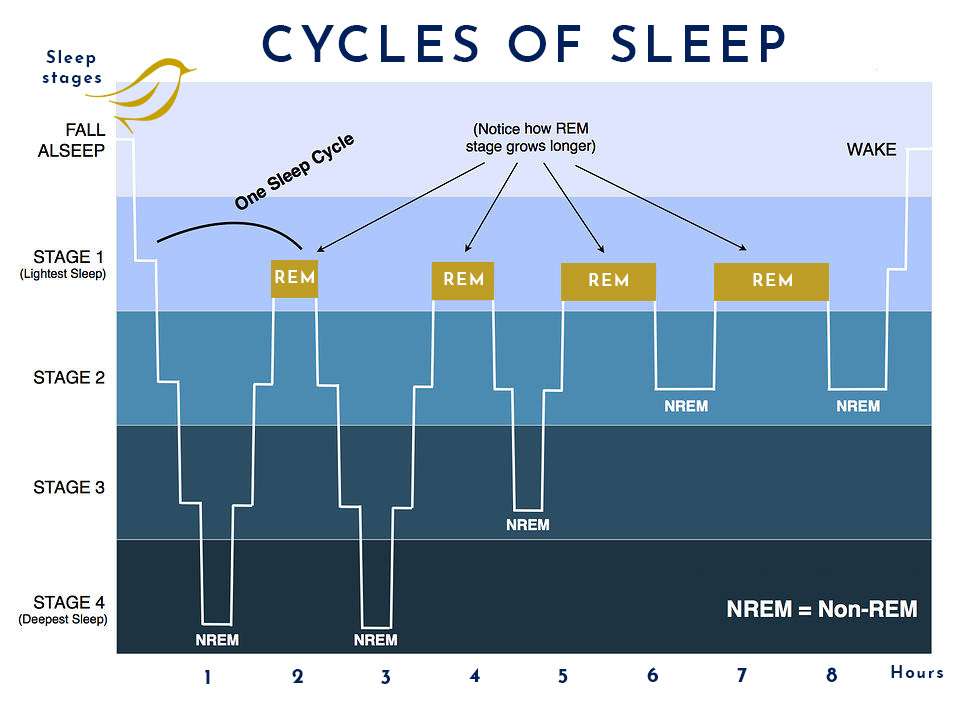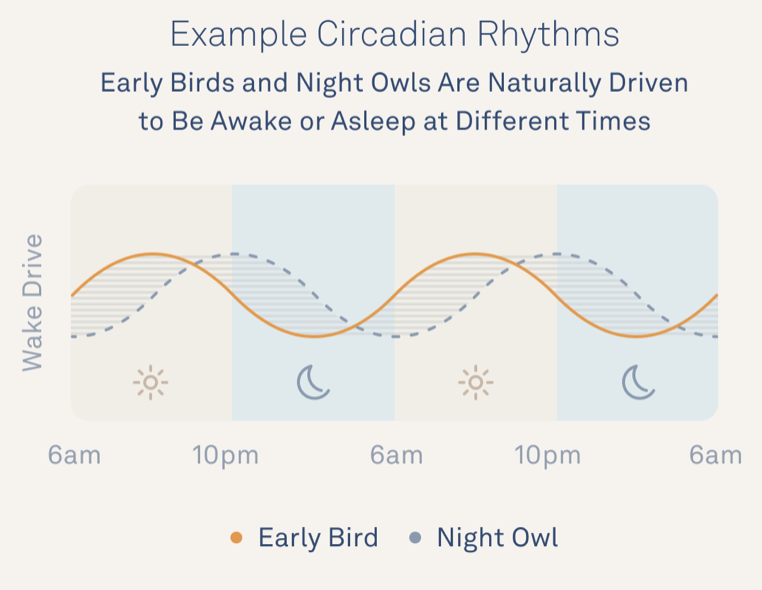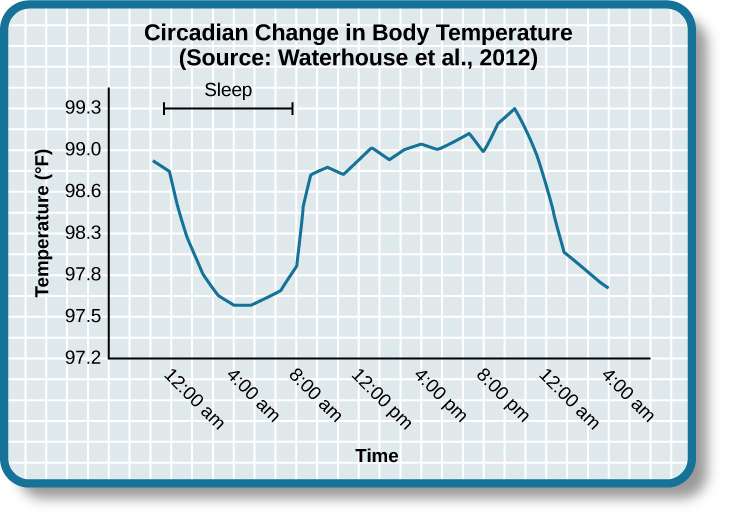How to improve sleep quality and quantity? In this blog, we’ll give you 5 science-based tips you can use to improve your sleep quantity & quality starting today.
Listen to the Blog
What Sleep Is and Sleep Phases
Before we jump straight to the 5 tips, let’s do a small recap of what sleep is and how it affects your body and mind.
Sleep occurs due to cooperation between your brain and body. Your brain is in charge of your internal clock by receiving feedback from your sensory organs, such as the vision of light. Other organs and cells throughout your body also transport information about the daily rhythm, trying to keep your body aligned with your internal clock. This cooperation between your brain and body happens daily to maintain a synchronized rhythm and let you fall asleep at the optimal time.
There are 2 main stages of sleep: Non-REM and REM, which stands for non-rapid eye movement (NREM) and rapid eye movement (REM). The Non-REM phases are further divided into 3 stages: Falling Asleep (N1), Light Sleep (N2), and Deep Sleep (N3).

Simplifying things, when you’re in a Non-REM stage, your body slows down, repairs itself, and your brain solidifies long-term memory. While in REM, which is when you dream, your breathing and heart rate increase as your brain works through stored information.

When you fall asleep, you cycle through all the phases multiple times, repeating them every 90 minutes or so. In general, the 1st part of the night contains more Non-REM sleep, while the latter part is more REM.

Consistent Bedtime Window
All sleep stages are equally important, so how can you ensure to get the right amount of each?
Our bodies are designed to switch between performing and recovering according to our internal 24h clock. This cycle is called “circadian rhythm,” and it is based on the patterns of the sun. It also divides us roughly into two main chronotypes you may have heard of, early birds and night owls.

You can not change your chronotype, but if you identify and understand it, you can better align your lifestyle and sleep according to it.

Due to the circadian rhythm, every one of us has an optimal timeframe for falling asleep. If we follow this timeframe, we increase our chances of getting the right amount of all the sleep stages and waking up well rested. So the first thing you can do to improve your sleep today is to adopt a consistent bedtime by understanding your circadian rhythm.
When you understand your chronotype, you can go to bed when most optimal by simply prioritizing it and testing out what works best for you. You can significantly improve your sleep by building your daily schedule and habits around this priority.
Optimal Room Temperature
Your chronotype also determines when your body temperature starts to drop. Our bodies, in fact, are programmed to experience a slight dip in core temperature 2 hours before bedtime, which coincides with the release of the sleep hormone melatonin. During sleep, the body temperature drops, reaching its lowest temperature in the early morning and gradually rising as the morning progresses.

Whether an early bird or a night owl, your bedroom temperature can significantly affect your sleep quality. Generally, the recommended room temperature for optimal sleep is about 18 degrees Celsius, or 65 degrees Fahrenheit. As a rule of thumb, it’s better to be a bit too cold than too hot. So, consider ditching the heavy pajama and blankets.
A hot shower before bed can also help you lower your body temperature, as it brings your blood to the surface, reducing the core body temperature and promoting sleep.
While if you’re up for some high-tech gadgets, you should check out the Pod 3 Cover by EightSleep, a mattress cover with advanced thermoregulation features.
Besides considering a warm shower for your pre-bed routine, there are other things you might want to implement.
Unwinding Routine
To maximize your sleep, you should synchronize your mind and body so that they are ready to drift off at the same time. We are all different, so what we do to prepare ourselves for sleep naturally differs from person to person. But there are some generic things you can do to help yourself to relax and unwind.
Generally, we should think about how we can support the alignment between the mind and the body so that their rhythm for sleep would be as synchronized as possible. Exposure to light, for example, is not ideal for sleep, as your internal clock will read light as “time to wake up.” So decreasing the exposure to light, especially blue light, is one example of how you can reduce the sensory information translated to your brain and simply help your mind unwind. To support the alignment, we also want our body to relax. So avoiding physical activity before sleep and other energy-consuming activities such as digestion caused by a late-night meal can help your body to calm down.
Designing a queue of routines you always do before bed helps you unwind and relax. Besides that, it will also help your body recognize when it is time for sleep. But how? When you create a routine habit that sends relaxing information to your mind and body, your brain creates an automatic queue of this information and can expect it in the future. So when the habit hardwires, your body will expect relaxation before even starting your actual routine, which will further increase the synchronized rhythm and improve your sleep.
Sleep Tracking
After you’ve solidified your routine, it’s time to focus on your actual sleep. How can you know how much and how well you’re sleeping? That’s when tracking comes into play!
That’s because what you focus on improves. Just as daily weighing yourself leads to better food choices, tracking your sleep will lead to better sleep hygiene.
The 1st thing I recommend is tracking your bedtime and wake-up time. You don’t need any special device for that. You can simply use your calendar. Just add a slot for your sleep, and that’s it.
This small habit will already make a big difference because, as we’ve seen, having a consistent bedtime window is crucial.
While if you’re a data nerd like we, you might consider getting a sleep tracker, which will give you a ton of data, including your heart rate, heart rate variability, sleep stages, SpO2, and much more. We use the Oura Ring, but there are other options on the market, such as the Whoop 4.0, Fitbit, and others.
With more data, you’ll be able to understand how optimal your sleep is and how certain habits and routines can affect it.
Sleep Breathing, Snoring, and Obstructive Sleep Apnea (OSA)
And in case you see something strange, like not ideal oxygen saturation or an elevated heart rate, you could be able to investigate it further. For example, how well do you breathe while you sleep?
An estimated 45% of adults occasionally snore, while 25% snore regularly, which means that 1 in 4 people watching this video snore (me being one of them). So, how can you precisely understand if and how much you snore? I use an app called SnoreLab, available both for iOS and Android, which records your snoring through the night.

Besides giving you a clear overview of your night concerts, you can check your sleep tracking device data and understand if there’s a correlation between your snoring and, let’s say, an increased heart rate. A 2019 peer-reviewed study estimated that almost 1 billion people suffer from some kind of obstructive sleep apnoea, so we should all ensure we breathe properly at night.
Science-Based Solutions to Improve Your Sleep
We hope these tips gave you some new insights on improving your sleep, whether you decide to take small improvements or directly go hardcore.
At Beyond Sapiens, we care about science-based solutions, so all the tips we share are based on research. If you want to improve your sleep further, you can find some interesting articles that back up our tips in the description. If you have any questions or want to share your perspective, please feel free to start a discussion in the comments.
We hope this blog post helped you gain a new perspective on the importance of your sleep!
If you’re ready to go Beyond Sapiens, you can learn more about our Individual & Business Maximization Coaching program.
Related Research & Articles
Consistent Bedtime Window
- “Circadian Rhythms and Your Bedtime” → https://ouraring.com/blog/circadian-rhythms-bedtime/
- “Eating habits and coordinating eating with bedtime has a huge impact on overall sleep quality” → https://europepmc.org/article/MED/34613509
Optimal RoomTemperature
- How to regulate body temperature for better sleep → https://ouraring.com/blog/natural-body-temperature
Unwinding Routine
- How to build clear sleep queues that align your body and mind for sleep → https://ouraring.com/blog/how-sleep-works/
- How to shut down your mind and relax your body for better sleep →https://ouraring.com/blog/mind-body-managing-stress/
- No screen time →https://www.newscientist.com/article/2336627-some-screen-use-before-bedtime-might-be-ok-for-your-sleep-after-all/
Breathing & Snoring
- SnoreLab App → https://www.snorelab.com/
- Estimation of the global prevalence and burden of obstructive sleep apnoea: a literature-based analysis → https://www.ncbi.nlm.nih.gov/pmc/articles/PMC7007763/






